Azerbaijan’s Victory: Initial Thoughts and Observations (and Caveats for the ‘Innovative’)
Simon anglim.

Dr Simon Anglim teaches in the Department of War Studies at King's College London, where he is in charge of the postgraduate Contemporary War and Warfare module. He has written two books and over a dozen articles on historical and contemporary military strategy, focusing particularly on the use of Special Forces in both historical and contemporary operations.

Victory in the 21st century
Autumn 2020 saw the Republic of Azerbaijan, a country in the South Caucasus, population around 10 million and annual military budget of just $2 billion, achieve something the USA and UK had not for nearly thirty years – winning a war. 10 November brought an armistice, brokered by Russia, ending the six week-long Azerbaijani offensive into Nagorno-Karabakh – the region of southwestern Azerbaijan which, according to viewpoint, was under illegal occupation by Armenia since the previous Armenia-Azerbaijan war of 1992-1994 or struggling for independence as the Armenian-majority ‘Republic of Artsakh’ – and the seven Azerbaijani districts also under Armenian occupation since 1994 surrounding it.[i] Under the terms of the armistice, Azerbaijan kept the territories it reconquered – four of the seven districts – while the Armenians ceded the other three, Azerbaijan thereby regaining around two-thirds of the territory lost in the 1990s.[ii] To Azerbaijanis[iii], ‘The Patriotic War’ is a historic triumph, the healing of a quarter-century old ‘bleeding wound’ central to their national identity, peaked by the recapture of the major historical and cultural centre of Shusha the week before the peace deal was signed.[iv] For Armenia it is the diametric opposite: the Armenian government and the armed forces of ‘Artsakh’ – the Nagorno-Karabakh Defence Force (NKDF) – failed demonstrably on every level despite obdurate fighting from soldiers on the ground and in the weeks after the peace deal mass demonstrations demanding the resignation of the government took place in Yerevan, some violent, and the period since February 2021 has brought persistent rumours of impending military coups in Armenia.[v]
Why does this matter beyond Baku and Yerevan? To begin with, these events demonstrate there might still be such a thing as ‘victory’ in 21st-century war and a place for conventional military force (i.e., force aimed at contesting territory and delivered by regular armies and air forces) in securing it. This flies in the face of some highly-publicized arguments that thanks to two decades of ‘unprecedented’ cultural and technological developments, ‘conventional warfare is dead’, military confrontations revolving increasingly around non-kinetic assets aiming at largely non-kinetic effects through applying or countering ‘hybridity’ somewhere in the ‘grey zone’, meaning ‘legacy’ capabilities including heavy armour and conventional manned aircraft should go firmly into the dustbin of history.[vi] However, most Western military punditry has focused on the most reported-on aspect of the war (at least outside the two belligerents) Azerbaijan’s extensive use of mainly Turkish-made Unmanned Combat Aerial Vehicles (UCAVs) and its apparent implications for future warfare and current acquisition policy. This includes some influential voices, at least in the UK.

‘Political Geography Now: Nagorno-Karabakh Control Map & Timeline: Artsakh Withdrawals – December 1, 2020’
Writing on potential futures for post-Brexit British armed forces, the Conservative MP and defence pundit, Bob Seely, commented on ‘how Azerbaijan’s use of inexpensive Turkish drones [sic] has decimated expensive Armenian equipment such as tanks and armoured vehicles, changing the balance of power on the battlefield’.[vii] This view is shared, apparently, by the most senior British decision-makers, the Defence Secretary, Ben Wallace, describing Turkey’s use of ‘drones’ in Libya, Syria and ‘elsewhere’ as ‘game changing’ and stating that the UK had some catching up to do, with implications for the upcoming UK Strategic Defence Review, rumours abounding of troop numbers and ‘legacy’ capabilities being cut in favour of greater ‘automation’ and ‘innovation’; it was reported subsequently that the review would commit to purchase cheap ‘attack drones’ based directly on evidence from Nagorno-Karabakh.[viii] The former chair of the House of Commons Foreign Affairs Committee, Sir Richard Ottaway, was more nuanced, acknowledging the part played by Azerbaijan’s careful alliance-building and acquisition policy but also claiming that the UCAVS were ‘pivotal’ in assaults on Armenian defensive positions and arguing the UK should develop its own low-cost equivalents to the Turkish TB2s employed in Nagorno-Karabakh to supplement the (highly expensive) Predators supplied by the US.[ix] No such nuance across the Atlantic, predictably, an article in Forbes , for instance, hailing the TB2s as a ‘silver bullet’, alluding to suggestions from some quarters that ‘the massacre [sic] of Armenian armor signals the end of the tank’ and that the acquisition of cheap UCAVs by small powers might provide challenges even to US forces; Radio Free Europe was even more effusive, proclaiming that ‘In Nagorno-Karabakh, the Future of Warfare is Now’.[x]
This is the author’s own contribution to this debate – his observations on what happened in Nagorno-Karabakh in autumn 2020, some suggesting many of the claims cited above may need to be nuanced or revised. He begins with strategy and the role of conventional warfare in achieving Azerbaijan’s policy aims.
Strategy and the Utility of Force – Conventional Warfare is alive and kicking Armenia
While the war demonstrates that conventional military force can still be brutally effective in securing policy aims, those aims must be clearly enunciated with an obvious and realistic political end state in mind and enjoy strong public support – things we have emphatically not seen in the West since the mid-2000s. It also helps if those aims can be framed in terms of securing objectives of geopolitical significance – something which conventional ground forces are designed to do – rather than more diffuse ones of ‘fighting terror’ or ‘implanting democracy’. While popular at home – even more so, now – President Ilham Aliyev is viewed widely outside Azerbaijan as an iron-fisted autocrat with an indifferent human rights record and allegations of industrial-scale corruption of Western legislators and officials laid against him.[xi] However, in 2020, President Aliyev (and given the highly personal nature of his rule, we presume it was mainly him) formulated realistic policy aims attainable by the means available centring on seizing key ground, as he made clear in an interview with the BBC on 9 November: if the Armenians committed to withdraw from the seven occupied regions around Nagorno-Karabakh (four largely re-taken by Azerbaijani forces by then) then he would halt the offensive and be willing to negotiate the future of Nagorno-Karabakh.[xii] However, he promised he would ‘fight to the end’ if they didn’t withdraw and also demanded a right of return for the Internally Displaced Persons (IDPs), Azeri families who fled to Azerbaijan from the occupied territories during and after the 1994 war, their numbers estimated by the United Nations High Council for Refugees as a possible 1.2 million by 2014.[xiii] Compare this with the outcome: President Putin’s peace deal mandated that Azerbaijan keep the four districts it had re-conquered while the Armenians handed over the whole of the remaining Aghdam, Kalbajar and Lachin districts at the beginning of December – so the war clearly achieved Aliyev’s primary geopolitical aim while opening paths for the others.[xiv]
He had also strengthened Azerbaijan’s hand via cultivating the right allies and if anything symbolised this, it is President Erdogan of Turkey being guest of honour at the victory parade in Baku on 10 December, a Turkish Army contingent marching past he and President Aliyev to the strains of the Ottoman march, Cedin Dedden .[xv] President Aliyev’s father, Heydar Aliyev, founder of modern Azerbaijan, described the relationship between the two countries as ‘One Nation, Two States’ – two Turkic peoples, with common ancestry and culture, speaking mutually-intelligible languages, with traditional enemies in common and therefore natural allies, an assumption shaping the younger Aliyev’s external policy and suiting President Erdogan’s ambitions for his country, also, Azerbaijan now providing a powerful bridgehead for Turkish influence in the Caucasus and Central Asia.[xvi] The two countries cooperate closely in the export of oil and gas dominating Azerbaijan’s economy and shaping the politics and society of this classic ‘rentier’ state, most prominently on the Baku-Tbilisi-Ceyhan oil pipeline through which up to 9 billion barrels per year flow on their way from Azerbaijan’s oil fields in the Caspian Sea to Western Europe.[xvii] Military cooperation is just as close, giving Azerbaijan the benefit of learning from a respected NATO military with credible warfighting capability tested for real in Syria and Libya. Turkey has provided Azerbaijan with training support and military equipment since 1992, Azerbaijani cadets attend the Turkish Military Academy at Ankara and the two armies exercise together frequently. In 2010 Turkey and Azerbaijan signed a treaty in which each promised to come to the aid of the other if attacked: a formal alliance in all but name, and an obvious expression of this was Azerbaijan spending unspecified millions – out of that defence budget of $2 billion per year – on buying 50 TB2 Bayraktar UCAVs from Turkey along with MAM-L laser-guided bombs (also Turkish made), the main weapons used by the TB2 in the war. Israel, another close security partner, provided Hermes and Heron reconnaissance UAVs while Azerbaijan’s own Azad system was also used for reconnaissance. Israel also supplied Harop loitering munitions, which Azerbaijan first used during previous fighting along the line of control with Nagorno-Karabakh in 2016. Given the TB2s arrived just a few months before the offensive began, it is entirely possible that some were flown by Turkish Air Force pilots, possibly from inside Turkey itself.[xviii] Another, just as telling expression of the alliance was the thirteen-day long exercise in Azerbaijan in August 2020 in which up to 11,000 Turkish troops participated and saw Turkish and Azerbaijani Special Forces practicing airmobile assaults on high value targets alongside each other.[xix] This close relationship paid off in fighting the war.
Fighting the war – was it the ‘drones’?
The war presents a real-world example of Clausewitz’s concept of strategy as ‘the use of engagements for the object of the war’, particularly as the very object of the war was seizing and securing territory, achieved through a series of battles.[xx] President Aliyev was smart enough to leave the management of this fighting to others: planning was carried out by the General Staff under Colonel General Najmedin Sadykov, like all senior Azerbaijani officers a product of the Soviet military education system, and a solid grasp of operational art is evident throughout.[xxi] The offensive was carried out by 1, 2 and 3 Corps of the Azerbaijan Army – a force of sixteen motor-rifle brigades with two artillery brigades controlled centrally – and consisted largely of a methodical advance aimed at seizing key towns, villages and chokepoints, resolving into two broad foci of effort: a push in the northwest of Nagorno-Karabakh aimed directly at its capital, Stepanakert, resolving itself into positional fighting around the town, going alongside an advance in the south through the more open country of the occupied Azerbaijani districts of Fuzuli, Cebrayil and Zangilan, aimed at the town of Zangilan in the far southwest – taken on 20 October – securing the entire length of Azerbaijan’s border with Iran. The taking of Zangilan was followed by a renewed offensive northward leading to the taking of Shusha, the centre of gravity of the whole of Nagorno-Karabakh: not only does Shusha have enormous cultural and emotional significance for both sides but it dominates the Lachin Corridor, the only line of communication between Stepanakert and Armenia and so taking it rendered the Armenian position across the whole of Nagorno-Karabakh untenable.[xxii]
Armenian/NKDF forces based their strategy on defence in depth with the apparent aim of making Azerbaijan’s advance as costly as possible. Nagorno-Karabakh’s mountainous terrain made such defences viable but the mountains also meant that lines of supply were limited and control of certain chokepoints was key – hence the importance of the Lachin Corridor.[xxiii] This went alongside using artillery, a combination of BM-30 Smerch multiple rocket launchers and Scud-B and SS-21 ballistic missiles, to attack cities in Azerbaijan with the aim, according to source, of attacking Azerbaijan’s deep lines of communication or of terrorising the population and putting the Aliyev regime under political pressure. This began on 4 October with missiles fired at Terter, Mingachevir and then against Ganja, Azerbaijan’s second largest city and nearly fifty miles behind the front.[xxiv] Ganja was hit again on 5-8 October, 11 October and 17 October each time killing civilians (for balance, Azerbaijani forces barraged built-up areas with Smerches, sometimes with cluster warheads, throughout the war).[xxv] Indiscriminate targeting of civilians not engaged in hostilities constitutes a war crime.[xxvi] It also perhaps constitutes a crass strategic error in this case – the oil refineries north of Baku are within range of Scud Bs fired from Nagorno-Karabakh and attacking them could have posited an existential threat to the Aliyevs’ rentier regime possibly inducing them to talk: nevertheless, there was just one report of an attempted attack, on 14 October.[xxvii]
The missile attacks proved a strategic distraction as the war was decided on the ground through some hard fighting. Combat seems to have been highly attritional, an advantage for Azerbaijan with its superior numbers, but for an outnumbered force supposedly being pulverised from the air by flying Terminators, the NKDF fought hard to the very end, inflicting heavy casualties on the Azerbaijanis in positional mountain combat in which, unsurprisingly, light infantry featured prominently and in which the Azerbaijanis clearly did not have it as easy as many Western pundits claim. Official figures for killed in action from September to November are 2,783 for Azerbaijan and 2,317-2,425 for Armenia; by way of comparison, Israel suffered 2,656 KIA in the Yom Kippur War of 1973.[xxviii] Azerbaijani troops – mainly conscripts and recently-mobilised reservists with varying quality of training – had to fight uphill through prepared lines and other positions, frequently under artillery fire from the defenders, to take a long series of fortified towns and villages, lists of names being broadcast nightly in the media and turned into memes on social media.[xxix] Typifying this was the battle for Fuzuli on 29 September, which began with Azerbaijani Special Forces occupying the hills around Fuzuli, cutting its communications with the intent of forcing the NKDF to abandon the town without serious fighting, a pattern repeated throughout the war in the s outh.[xxx] However, this was followed up by a conventional advance combining tanks with mechanised forces, the Azerbaijanis suffering some considerable losses of armour and people as the NKDF carried out a fighting retreat, most losses being to portable ATGMs or artillery, an indicator of why the offensive in the north bogged down into positional warfare for the rest of the war.[xxxi] Azerbaijani forces had little close air support throughout the war: Azeri Mi-24s were not committed until 5 October, fully a week after the offensive began and their contribution seems to have consisted of firing rockets from maximum range, aimed at saturating areas rather than hitting specific targets and much of their heavier artillery, the MRLS, for instance, seem to have been committed to barraging Stepanakert rather than supporting the advance in the south.[xxxii] NKDF forces were able to organise local counterattacks up to the closing days of the war, such as that on an Azerbaijani tank battalion which got within four miles of the Lachin corridor only to be driven back by MRLS fire with several tanks destroyed and the decisive moment of the war, the recapture of Shusha, actually took place in overcast weather restricting the use of UCAVS and any other air support, and was brought around by lightly-armed Azerbaijani Special Forces advancing through the mountains behind the city to take its garrison by surprise.[xxxiii]
So, what part did the UCAVs play in all this? Certainly, an important one but perhaps not as all-encompassing as some claim. ‘Drone’ strikes began on 27 September, concentrating heavily on the NKDF’s short-ranged air defences, over the first few days destroying fourteen SA-8s/SA-13s, four SA-10s and eight air defence radars, all struck by TB2s with a SA-3 near Stepanakert being taken out by a Harop. With these strikes we offer our first point of contention, that these were elderly Soviet-era systems largely incapable of tracking targets with radar signatures as small as the UCAVs presented; moreover, NKDF radars were jammed extensively by Turkish-supplied systems and, indeed, further TB2 attacks took out the NKDF’s two Russian-supplied Repellent 1 counter-UAV systems which detect incoming UAVs by their control signals.[xxxiv] Consequently, NKDF forces often operated blind and without any serious air defence, a major force multiplier for the Azerbaijanis and their Turkish allies. Following this, the UCAVS were switched to attacking ground targets with priority given to artillery, MRLS, tanks and supply dumps and vehicles moving along roads behind the battlefield.[xxxv] Noteworthy incidents included that of 1 October, where a NKDF armoured force massing for a counterattack in the north came under sustained UCAV attack, losing ‘many tanks’ and by 23 October independent open-sources were estimating that the NKDF had lost 144 T-72s, 35 BMPs, 310 soft-skinned vehicles and 116 artillery pieces; which system was hit by what was unclear, but the same sources estimated Azerbaijani Harops had destroyed 34 targets and ground-launched ATGMs 21 with much of the balance, presumably, going to the TB2s.[xxxvi]
Impressive figures, but context helps here. UCAV footage featured prominently on Azerbaijani television and on electronic billboards in Baku, forming a key part of Azerbaijan’s intensive multi-lingual social media campaign, ‘snuff movies’ posted to YouTube and Twitter selling the narrative of Azerbaijan smashing its detested foe with impunity. There is little surprising here for the experienced eye, the films reinforcing the eternal adage that on the modern battlefield, being seen is being hit, one tank, AFV or truck after another getting ‘plinked’ in masses of smoke and flame by MAM-Ls or other systems the Bayraktars and other UAVS are spotting for. Just as evident is the poor discipline and drill of the crews; on one level, there was the extensive use of mobile phones with GPS and even postings to social media by soldiers of both sides, showing their locations for all to see; on another, the films show target after target moving and sometimes parked in the open in broad daylight with no camouflage or overhead cover when stationary or even in prepared positions, so making life easier for the UCAV pilots than better trained and disciplined opposition might do.[xxxvii] Michael Kofman of the Wilson Centre and Jack Watling of the Royal United Services Institute (RUSI) both investigate these phenomena in detail, contending that NATO/Western mechanised forces would be just as vulnerable when manoeuvring, particularly given the modern battlefield is swept by long-range radars and electronic surveillance and most camouflage will not protect against modern infra-red detection systems. However, solutions differ, Kofman arguing for smaller forces with more extensive air defence, while Watling contends that ‘swarming’ can be forestalled by dispersing forces in non-tactical phases such as Armenia and Azerbaijan did not do: consequently, the tank might is not obsolete but needs to fit into a new tactical system emphasising moving dispersed but concentrating rapidly for the tactical phase.[xxxviii] To this we can add that NATO or Russian formations are likely to have air defences far more capable of engaging small, evasive targets: it is also remarkable that despite the Azerbaijani acquisition of the TB2s being ‘open book’, NKDF forces were not equipped with smoke generators or laser detection systems which would have given their vehicles at least some degree of forewarning and protection against laser guided weapons like the MAM-L.[xxxix] Claims of yet another ‘revolution in military affairs’ might therefore need some qualification.
Conclusions
The Nagorno-Karabakh war is significant for those with professional or academic interest in 21st-century war in that, alongside recent action in Ukraine, Iraq and Syria, it suggests claims about the death of conventional warfare might be premature. Rather, it might just have a present and a future, too. The war saw a series of conventional operations carried out by the Azerbaijan Army, with assistance from Turkey, attaining most of the geopolitical objectives their President and Commander in Chief set them: these operations hinged on high-intensity attritional combat aimed at seizing key ground, culminating in the securing of a major centre of gravity unhinging the entire Armenian position in Nagorno-Karabakh – so the basics of land warfare still count in scenarios like this one. Casualty figures were high for small countries engaged in a short war, but given we are dealing with two intensely nationalistic cultures fighting over territory, and the public and political reactions on both sides, the sacrifice seems to have been deemed worth it at least by Azerbaijan. However, when divorced from this they indicate eternal issues of attacking prepared positions in rough country and the need to coordinate infantry with support fires, something which might not have been done very efficiently here.
The much-hyped UCAVs contributed to Azerbaijan’s success in two ways, both important but hardly ‘revolutionary’ in that they provided a cheaper means of achieving things done traditionally by manned aircraft. First was suppressing enemy air defences in the opening stages, opening the Armenians up to the second impacting factor, deeper attacks destroying armour and disrupting lines of communication, tipping the balance of attrition in Azerbaijan’s favour in what was still a costly win for them. Here is something else transferable to other scenarios: ‘swarms’ of small UAVs and UCAVS might be a good – and cheap – investment but the conditions for best use need to be present, one being tactically inept opposition with air defences which can be overwhelmed early by swarming SEAD attacks; dealing with, for instance, the layered air defences forming an umbrella over large Russian formations might be a different problem. It might also be that the real messages here are not so much about the future of armour as that of tactical ‘fast air’ and attack helicopters, the Bayraktars in particular producing similar desired effects as these systems have for two generations for a fraction of the cost and with systems – unlike fast air and attack helicopters – their users could afford to lose and were cheap to replace. That might be the real transferable military message here while the political one might concern the acquisition policies of certain NATO countries, such as the UK, based on buying small numbers of highly expensive systems, and what those systems offer in reality.
My thanks to Miss Jamila Mammadova, Dr Mark Baillie, Brigadier Ben Barry, Major Sean Cronin-Nowakowski and others for their input to this paper.

[i] ‘Armenia, Azerbaijan and Russia sign Nagorno-Karabakh peace deal’ https://www.bbc.co.uk/news/world-europe-54882564 [ii] ‘Karabakh on the map: What Azerbaijan gains after war’, https://www.eng.kavkaz-uzel.eu/articles/52755/ [iii] ‘Azerbaijanis’ refers to citizens of The Republic of Azerbaijan, ‘Azeris’ to the majority ethnic group, making up around 92% of the population of 9.8 million, the other 8% including Dagestanis, Russians and Armenians. [iv] ‘Victorious Commander-in-Chief, President Azerbaijan Ilham Aliyev calls Commander of the Joint Corps, Lieutenant General Hikmat Mirzayev’, https://en.trend.az/azerbaijan/politics/3331351.html This paper examines military operations in the 2020 war, therefore those interested in a detailed discussion of the origins of the Nagorno-Karabakh conflict might wish to look elsewhere. Impartial analysis is very hard to come by, but some honourable exceptions to this include Thomas de Waal, The Caucasus: An Introduction (Oxford: OUP 2010), especially pp.98-130, while Suha Bolukbasi’s Azerbaijan: A Political History (London: IB Tauris 2014) is a history of Azerbaijan’s road to independence which centres on the issue. [v] ‘Hundreds protest in Armenia after PM ignores deadline to resign’ https://www.aljazeera.com/news/2020/12/8/hundreds-protest-in-armenia-after-pm-ignores-deadline-to-resign [vi] For just a small sample of this, see Ciaran McGrath, ‘Conventional war is dead’ Expert says West is ‘wasting money’ on weapon systems’, https://www.express.co.uk/news/world/1148793/world-war-3-warfare-west-china-russia-south-china-sea-crimea-ukraine ; Jahara Matisek, ‘The Death of American Conventional Warfare’, https://www.realcleardefense.com/articles/2017/11/06/the_death_of_american_conventional_warfare_112586.html ; R Jordan Prescott, ‘Goodbye Conventional War. It’s Been Fun’, https://mwi.usma.edu/goodbye-conventional-war-fun/ [vii] Bob Seely, ‘Britain can lead in the new age of warfare’, https://www.telegraph.co.uk/news/2020/11/19/britain-can-lead-new-age-warfare/ [viii] Rahim Rahimov, ‘Russia Versus Turkey: Drone Battles and Gas Disputes’, https://www.wilsoncenter.org/blog-post/russia-versus-turkey-drone-battles-and-gas-disputes ; Larisa Brown, ‘Defence Secretary Ben Wallace signals drones could replace troops as he warns that the UK must be ready to fight 'tomorrow's battles, not yesterday's' because Britain's enemies have 'studied our vulnerabilities' , https://www.dailymail.co.uk/news/article-8731999/Defence-Secretary-Ben-Wallace-signals-drones-replace-soldiers-battles-future.html ; Dan Sabbagh, ‘UK wants new drones in wake of Azerbaijan military success’, https://www.theguardian.com/world/2020/dec/29/uk-defence-secretary-hails-azerbaijans-use-of-drones-in-conflict [ix] Sir Richard Ottaway, ‘UK “must learn lessons” of the Nagorno-Karabakh conflict’, https://ukdefencejournal.org.uk/uk-must-learn-lessons-of-the-nagorno-karabakh-conflict/?no_cache=1610617346&fbclid=IwAR05Uv3WvbpsrQUWc2Ih3eAlBCfoPMUV354dWBT6TD-dlS0dc7CwMNXa6N4 [x] David Hambling, ‘The “Magic Bullet” Drones Behind Azerbaijan’s Victory over Armenia’, https://www.forbes.com/sites/davidhambling/2020/11/10/the-magic-bullet-drones-behind--azerbaijans-victory-over-armenia/?sh=128de7005e57 ; Mike Eckel, ‘Drone Wars: In Nagorno-Karabakh, the Future of Warfare is Now’, https://www.rferl.org/a/drone-wars-in-nagorno-karabakh-the-future-of-warfare-is-now/30885007.html [xi] The term ‘Caviar Diplomacy’ was invented specifically to describe Azerbaijan’s expensive lobbying - particularly in the UK and Western Europe but also involving members of the US Congress - allegedly accompanied by extravagant gift-giving and offering of lucrative business contracts to individuals. For a small sample of opinion, see ’Caviar Diplomacy: How Azerbaijan Silenced the Council of Europe’, https://www.esiweb.org/publications/caviar-diplomacy-how-azerbaijan-silenced-council-europe ; Matthew Valencia, ‘Caviar Diplomacy in Azerbaijan’, https://www.economist.com/1843/2016/08/31/caviar-diplomacy-in-azerbaijan ; ‘Azerbaijan revelations spark “great concern” at Council of Europe’, https://www.theguardian.com/world/2017/sep/05/azerbaijan-revelations-could-herald-shake-up-at-council-of-europe [xii] The whole interview can be viewed at https://www.youtube.com/watch?v=eP98bXyWBdc&feature=youtu.be [xiii] Ibid; UNHCR publication for CIS Conference (Displacement in the CIS) - Conflicts in the Caucasus https://www.unhcr.org/publications/refugeemag/3b5583fd4/unhcr-publication-cis-conference-displacement-cis-conflicts-caucasus.html ; ‘Organisation of Statistics on Refugees and Internally Displaced Persons in the Republic of Azerbaijan’, United Nations Statistics Division 2014, https://unstats.un.org/unsd/statcom/doc15/Statement-3d-Azerbaijan.pdf [xiv] ‘Main Points of Nagorno-Karabakh Peace Deal’, https://www.themoscowtimes.com/2020/11/10/main-points-of-nagorno-karabakh-peace-deal-a72003 ; Matthew Bryza, ‘Azerbaijan-Armenia peace deal could be the diplomatic breakthrough the region needs’, https://www.atlanticcouncil.org/blogs/new-atlanticist/azerbaijan-armenia-peace-deal-could-be-the-diplomatic-breakthrough-the-region-needs/ ; Jack Losh, Russian Troops in Nagorno-Karabakh ‘Clearly a Win for Moscow’, https://foreignpolicy.com/2020/11/25/russian-troops-nagorno-karabakh-peackeepers-win-moscow-armenia-azerbaijan/; The future of Nagorno-Karabakh has become ambiguous as it is now effectively under Russian control given the presence for at least the next five years of President Putin’s 2000-man ‘peacekeeping’ force, established in Nagorno-Karabakh’s capital, Stepanakert, and along the Lachin Corridor connecting it with Armenia, a strong and probably permanent Russian presence in the region. While pure speculation, it may be that Putin, a gifted strategist with a record of wrong-footing friend and foe alike, tailored the peace agreement to President Aliyev’s stated aims and given the timing of President Aliyev’s interview, he may have known this in advance. [xv] 'One nation, two states' on display as Erdogan visits Azerbaijan for Karabakh victory parade’ https://www.france24.com/en/asia-pacific/20201210-one-nation-two-states-on-display-as-erdogan-visits-azerbaijan-for-karabakh-victory-parade ; see also https://www.youtube.com/watch?v=SY_dUaV5uIA [xvi] Although not a common religion – Azerbaijan is one of three majority Shi’ite Muslim countries in the world while Turkey is predominantly Sunni. These differences have been blunted for much of the modern period by the culture and politics of both countries being heavily secularised and Mr Erdogan’s attempts to re-Islamify Turkish politics and culture do not seem to have affected this. [xvii] The other major partner is British Petroleum, which manages the line. For a good intro to Azerbaijan’s oil, see de Waal, Caucasus, pp.167-187 [xviii] Alexander Mladenov, ‘Drone Wars in the Caucasus’, Airforces Monthly, No.383 December 2020, p.81 [xix] Vasif Huseynov, ‘Azerbaijan, Turkey Hold Large-Scale Military Drills Amidst Escalation of Tensions With Armenia’, https://jamestown.org/program/azerbaijan-turkey-hold-large-scale-military-drills-amidst-escalation-of-tensions-with-armenia/ ; [xx] Carl von Clausewitz, On War, translated by Michael Howard and Peter Paret, (London: Everyman’s Library 1993), p.146 [xxi] It is worth recalling that the Azerbaijan Army had operational experience prior to September 2020. Many veterans of the 1994 war serve in senior ranks, there were prolonged outbreaks of serious fighting along the Line of Control between Azerbaijan and the occupied territories in 2008, 2010, 2016 and July 2020 and small Azerbaijani contingents have participated in US/NATO led missions in Kosovo, Afghanistan and Iraq. [xxii] European Asylum Support Office, ‘The course of the Nagorno-Karabakh armed conflict and its impact on the civilian population’, 10 November 2020, accessible at https://coi.easo.europa.eu/administration/easo/PLib/2020_11_Chronology_Armenia_Azerbaijan_Nagorno_Karabakh_armed_conflict_impact_civilian_population.pdf p.13; personal correspondence with contacts in Baku. [xxiii] See Sebastian Roblin, ‘What Open Source Intelligence tells us about the Nagorno-Karabakh War’ https://www.forbes.com/sites/sebastienroblin/2020/10/23/what-open-source-evidence-tells-us-about-the-nagorno-karabakh-war/?sh=1917791a6f4b [xxiv] EASO Report, p.5 [xxv] Ibid, pp.5-6; Roblin, ‘Open Source Intelligence’ [xxvi] International Committee of the Red Cross, The Conduct of Operations, Part A: Common Features of the Law Applicable to all Operations, https://www.icrc.org/en/doc/assets/files/other/law3_final.pdf , especially pp.2-3 to 3-3 [xxvii] EASO Report, p.7 [xxviii] ‘Azerbaijan Says Nearly 3,000 Troops Killed in Nagorno-Karabakh Fighting’, https://www.voanews.com/south-central-asia/azerbaijan-says-nearly-3000-troops-killed-nagorno-karabakh-fighting ; Azerbaijan says 2,783 soldiers killed in Nagorno-Karabakh clashes, https://www.aljazeera.com/news/2020/12/3/azerbaijan-says-2783-soldiers-killed-in-nagorno-karabakh-clashes ; ‘Armenia sharply raises troop death toll in Nagorno-Karabakh as political crisis brews’, https://www.latimes.com/world-nation/story/2020-11-19/armenia-raises-troop-death-toll-nagorno-karabakh [xxix] Mladenov, Ibidm p.82; Roblin ‘Open Source Evidence’ [xxx] https://www.rferl.org/a/technology-tactics-and-turkish-advice-lead-azerbaijan-to-victory-in-nagorno-karabakh/30949158.html [xxxi] https://warontherocks.com/2020/10/the-second-nagorno-karabakh-war-two-weeks-in/ [xxxii] Mladenov, Ibid, p.82 [xxxiii] How the special forces of the Armed Forces of Azerbaijan liberated Shusha from occupation. News "Moscow-Baku" with Anna Nemolyakina, https://archive.is/NdmgM [xxxiv] Mladenov, ‘Drone Wars’, pp.78-79; Roblin, ‘Open Source Evidence’ [xxxv] 35. Roblin, ‘Open Source Evidence’ [xxxvi] Michael Kofman and Leonid Nersisyan, ‘The Second Nagorno-Karabakh War, Two Weeks In’, https://warontherocks.com/2020/10/the-second-nagorno-karabakh-war-two-weeks-in/ ; Stijn Mitzer and Jakub Janovsky, ‘The Fight For Nagorno-Karabakh: Documenting Losses on The Sides Of Armenia and Azerbaijan’, https://www.oryxspioenkop.com/2020/09/the-fight-for-nagorno-karabakh.html [xxxvii] Rob Lee of King’s College London has studied the war extensively, and stresses the poor mobile phone discipline of both sides on https://www.iiss.org/events/2020/12/the-nagorno-karabakh-conflict-military-lessons-for-middle-powers ; refer also to https://www.militarytimes.com/news/your-military/2020/09/30/armor-attrition-in-nagorno-karabakh-battle-not-a-sign-us-should-give-up-on-tanks-experts-say/ ; https://www.youtube.com/watch?v=O5M-bATygy8 (which also shows UAVs guiding artillery strikes and strikes on soft-skinned vehicles all the way down to UAZ jeeps; https://www.youtube.com/watch?v=TFcH5zt2rCw ; https://www.youtube.com/watch?v=rJR6K_tTSq0 for just a small sample of this. [xxxviii] Kofman in https://www.iiss.org/events/2020/12/the-nagorno-karabakh-conflict-military-lessons-for-middle-powers ; Jack Watling, ‘The Key to Armenia’s Tank Losses: The Sensors, not the Shooters’, RUSI Defence Systems, 6 October 2020, https://rusi.org/publication/rusi-defence-systems/key-armenia-tank-losses-sensors-not-shooters [xxxix] Mladenov, ‘Drone Wars’, p.82

Patriotic War
For almost 30 years, Azerbaijan tried to resolve the Armenia-Azerbaijan conflict through negotiations with Armenia, which had occupied 20 percent of its territory. The talks yielded no results. On the contrary, it was clear that the Armenian side was simply trying to gain time, to consolidate the status quo, to perpetuate it. Azerbaijan could not and did not come to terms with the occupation.
Over the said period, due to his foresight and wisdom, national leader Heydar Aliyev did tremendous work for the comprehensive development of Azerbaijan and for the solidifying its political and economic independence.
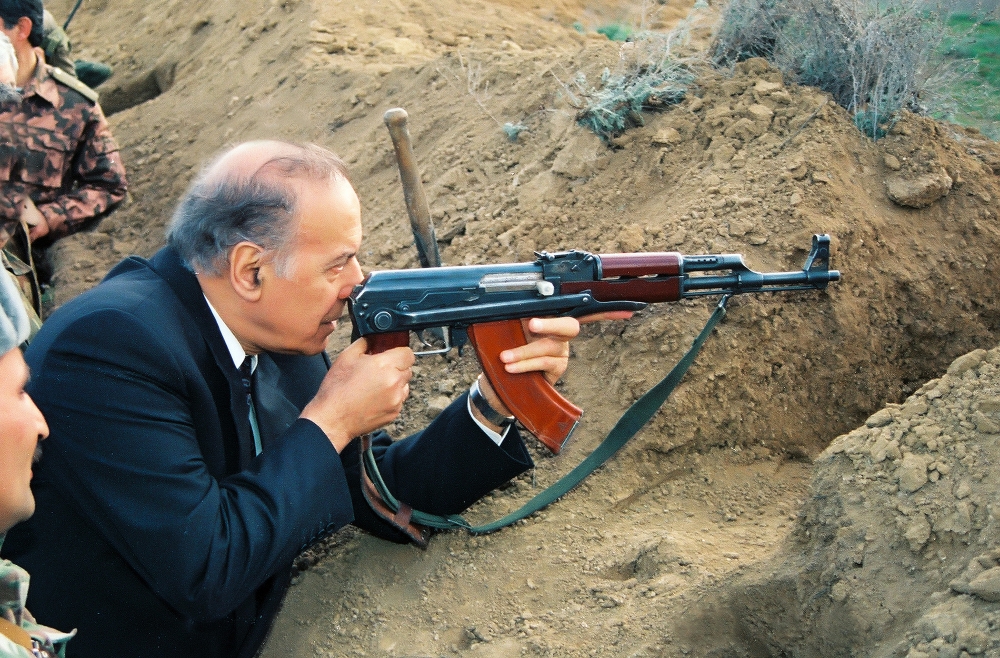
President of the Republic of Azerbaijan Ilham Aliyev, who successfully continues this path, stated the importance of economic strength, first of all, for the restoration of the country’s territorial integrity. As a result of the accurate and thought-out policies, Azerbaijan began to gain strength, secured its economic independence and became a modern state economically independent of anyone, any country or international financial institution. He created a unique model of development in the world. The country’s economic growth led to a turnaround in army building. The Azerbaijani Army’s arsenal was replenished with advanced weapons and military equipment. The knowledge and skills of Azerbaijani servicemen were enhanced and significant steps were taken to improve their social protection and professional environment. Azerbaijan’s defense industry was developed and most of the army’s domestic needs were met through domestic production. Azerbaijan began to produce more than 1,000 types of military products and became an exporter of the most modern weapons. The high combat capability of the Azerbaijani Army was demonstrated to the world in numerous military parades in Azadlig Square.
Most importantly, over the past 30 years the people of Azerbaijan never put up with the occupation and showed unwavering determination in the restoration of their territorial integrity. The patriotic youth that has matured under the leadership of President Ilham Aliyev has repeatedly proved that they were ready to make any sacrifice in the interests of the Motherland.
Over the said period, Azerbaijan has significantly strengthened its standing as a reliable partner, enhanced the country’s reputation and turned its determination into the crucial factor in the region through the implementation of multifaceted, principled and authentic foreign policy, active engagement with international organizations and foreign countries and forging close relations, as well as implementation of regional energy and communication projects.
All these factors fully conditioned the absolute victory of Azerbaijan and made it only a matter of time.
Azerbaijan has repeatedly called on Armenia to return the occupied territories, but Armenia not only ignored those calls, but also felt encouraged to occupy more of Azerbaijan’s lands and opted, instead, for a series of military provocations.
By torpedoing the format and subject matter of the negotiations, by creating a semblance of negotiations, by not implementing the UN Security Council resolutions and decisions, Armenia explicitly showed that it was not in favor of peace.
The statement of the Armenian Prime Minister Nikol Pashinyan in Khankendi on 5 August 2019 that “Karabakh is a part of Armenia and full stop” became one of the most obvious admissions of Armenia’s policy of aggression. President of the Republic of Azerbaijan Ilham Aliyev reacted harshly to Pashinyan’s statement during his speech at the 16th annual meeting of the Valdai International Discussion Club on 3 October 2019, saying that “Karabakh is Azerbaijan and an exclamation mark.”
President Ilham Aliyev clearly describes this period: “Indeed, they refer to Nagorno-Karabakh as an independent state. They then published new maps and began to attribute all the adjacent districts to Nagorno-Karabakh. Our towns and villages were renamed, and finally we were threatened with a new war for new territories. This was stated by their defense minister named Tonoyan. He announced that Armenia was preparing for a new war for new territories.”
In July 2020, Armenia committed another military provocation in the direction of Tovuz on the state border with Azerbaijan. The purpose of the provocation was to create a new source of tension in the region, to put the issue of occupation of Azerbaijani territories on the backburner, to involve third countries in the conflict and to cause damage to Azerbaijan’s strategic infrastructure. The Azerbaijani Army responded with a crushing blow to the enemy.
In August 2020, Armenia resorted to yet another military provocation by sending a sabotage group to Azerbaijan to commit acts of terror. However, the Azerbaijani Army foiled this subversive plan too.
Speaking at the 75th session of the UN General Assembly on 24 September 2020, President Ilham Aliyev warned the international community that Armenia was preparing for a new war against Azerbaijan: “Armenia has recently adopted an aggressive and belligerent military doctrine and national security strategy… We call on the United Nations and the international community to deter Armenia from another military aggression. Responsibility for the provocations and the escalation of tensions lies squarely with the military-political leadership of Armenia.”
Thus, the military-political leadership of Armenia did not learn the lesson from the battles of April 2016 and the battles of July 2020, and continued to aggravate the situation.
On 27 September 2020, a counter-offensive was launched in response to Armenia’s yet another large-scale military attack on Azerbaijani Army positions and civilian settlements. The counter-offensive later became known as Operation Iron Fist that led to the Patriotic War.
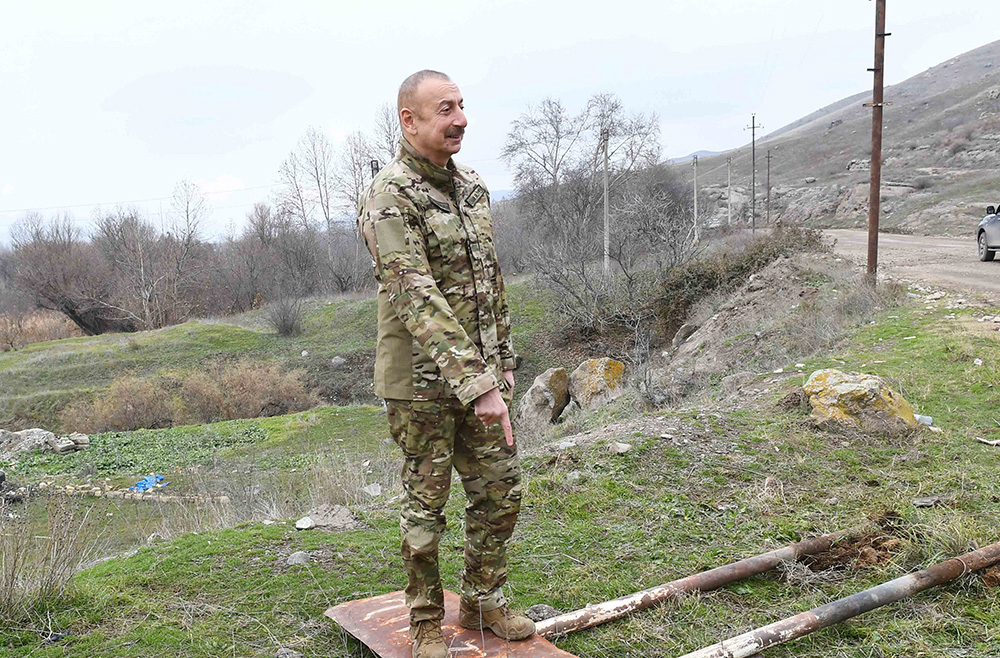
During the 44-day Patriotic War, President of the Republic of Azerbaijan, Supreme Commander-in-Chief Ilham Aliyev regularly addressed the people. Those addresses brought the people of Azerbaijan even closer together, united them like a fist and had a tremendous impact on the course and outcomes of the war. Every appeal was a harbinger of further victories.
In his first address to the people during the Patriotic War on 27 September 2020, the President of Azerbaijan called on the nation to achieve the resolute victory. “We are on the right path. Ours is the cause of justice. We will win! Karabakh is ours! Karabakh is Azerbaijan!”
In his second address to the nation on 4 October 2020, President Ilham Aliyev showed the enemy its place: “Now we have shown who is who… We are carrying out our salvation mission and we will do it!”
In his third address to the nation on 9 October 2020, the President of Azerbaijan declared that the status quo no longer existed and the line of contact had been smashed. “I have changed the status quo. I have changed it! Right there, on the battlefield. There is no status quo any more. There is no line of contact, it doesn’t exist. We have broken through it. They had been building this line of contact for 30 years. No-one can withstand the Azerbaijani soldiers.”
In his next address to the nation on 17 October 2020, President Ilham Aliyev conveyed the message that Azerbaijani cities subjected to missile attacks had become a symbol of resistance to Armenia’s state terrorism and vandalism against civilians. “No threat, no intimidation, no pressure can affect my resolve. Ours is the cause of justice. We are fighting on our own land; we are restoring our territorial integrity.”
In his fifth address to the nation on 20 October 2020, the President of Azerbaijan noted that the results achieved were the fruition of deliberate and timely steps, adding that haste was unacceptable: “Every time I address my people, I share good news. At the same time, I mention the names of new villages and cities liberated from occupation through my Twitter account almost every day. I know that the people of Azerbaijan are looking forward to this news every day, every single day! They await every day and every hour for this news to come out. But I want my dear people to know that the liberation of every village and every height requires great courage. There are not only fortifications there, but also the natural terrain of the liberated lands is more advantageous for the Armenians. We have to fight not only against their fortifications, their cannons and their missiles, but also against the natural terrain as we liberate our lands from the invaders inch by inch.”
In his sixth address to the nation on 26 October 2020, the head of state shared the good news that the Azerbaijani people were close to the decisive victory. “We are liberating these lands at the cost of lives of our soldiers and officers. We have asserted ourselves in the world both on the battlefield and in the political arena. We have proved that the people of Azerbaijan are proud, brave people and invincible people.”
8 November 2020 is inscribed in the history of Azerbaijan as Victory Day in golden letters. President Ilham Aliyev made his seventh address to the nation from the Alley of Martyrs and announced the liberation of Shusha to the people of Azerbaijan and Azerbaijanis all over the world. “I have also visited the grave of Great Leader Heydar Aliyev today and paid a tribute of respect to him. I said in my heart that I was a fortunate person to have fulfilled a father’s will. We have liberated Shusha! This is a great victory! The souls of our martyrs and the Great Leader are rejoicing today! May you rejoice Azerbaijan! May you rejoice Azerbaijanis of the world! … The people of Azerbaijan are united like this fist today! This will always be the case! This unity will last forever! This unity will help us to accomplish all our goals in the future… Dear Shusha, you are free! Dear Shusha, we have returned! Dear Shusha, we will revive you!”
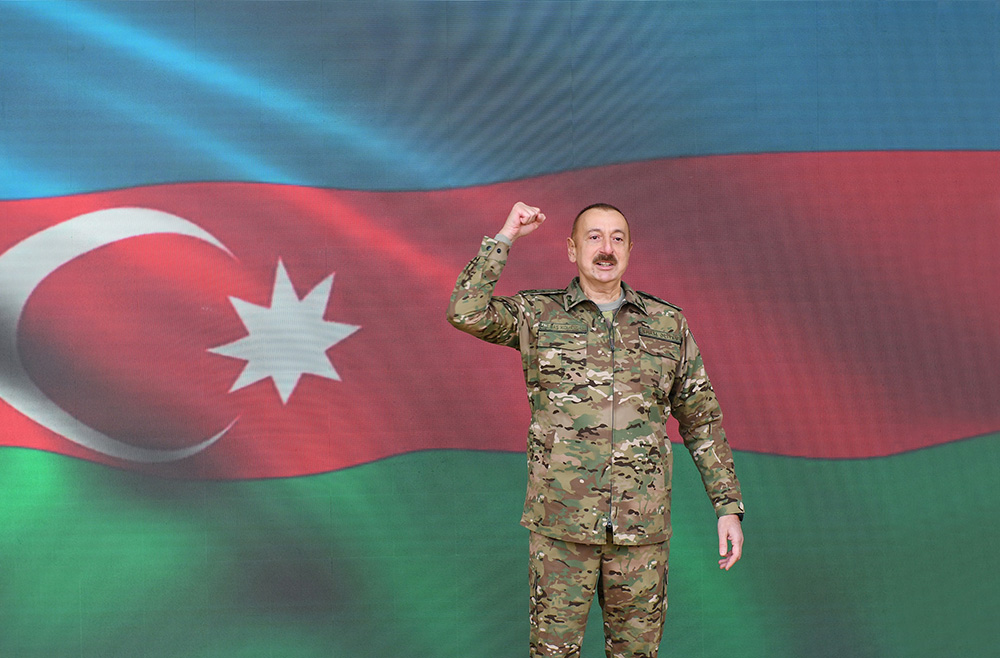
One day after the liberation of Shusha, more than 70 other settlements were liberated. The enemy was brought to its knees and had no choice but to sign an act of capitulation.
On 10 November 2020, the act of Armenia’s capitulation, the “Statement of the President of the Republic of Azerbaijan, Prime Minister of the Republic of Armenia and President of the Russian Federation” , was signed. On the same day, in his eighth address to the nation, Ilham Aliyev announced that his phrase “Karabakh is Azerbaijan and an exclamation mark”, which had become a national slogan, already covered the whole of Karabakh and put an end to the Armenia-Azerbaijan conflict. “What happened to the status quo? … There is no status and never will be. As long as I am President, this will not happen. Therefore, that document has a tremendous significance. I am sure that all Azerbaijani citizens believe that these days and minutes are the happiest in their lives. I am also fortunate to convey good news and these messages to the Azerbaijani people. I am delighted to have signed this historic document. I am happy that we are returning to our homeland, to our native Karabakh, Shusha - Karabakh’s crown jewel, and we will always live in these lands! From now on, no-one can force us from these lands!”
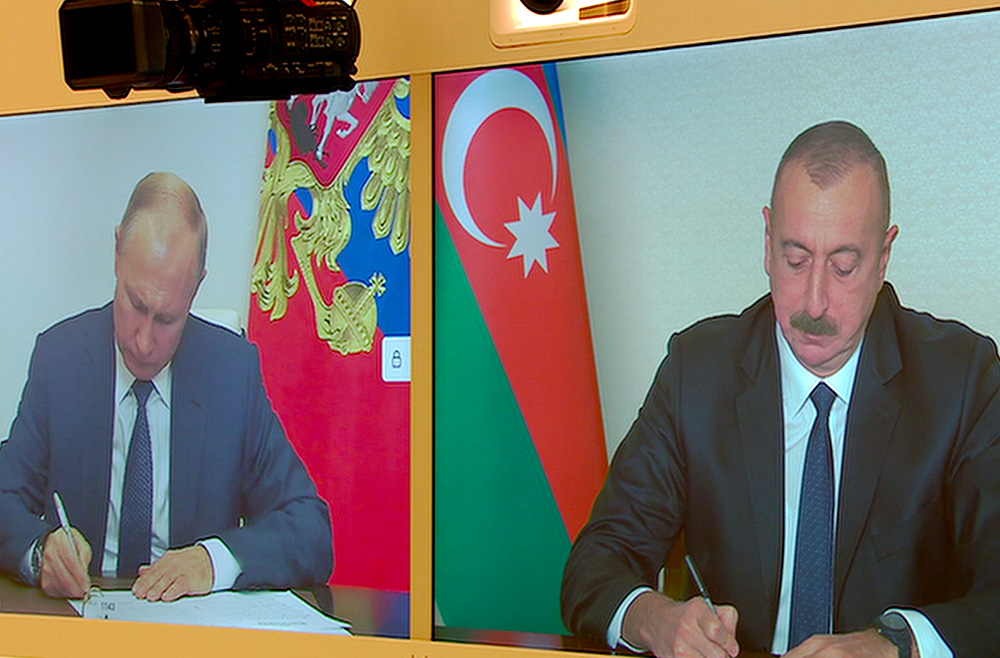
The President of Azerbaijan said that the outcome of the war was the best example to understand the difference between Azerbaijan and Armenia: “Did we have a single deserter? We didn’t! Not a single person! That is the people of Azerbaijan! Civilians lost their homes, their property, their loved ones, but were still saying “Long live the Motherland.” Charge, only charge! The letters to me say, “Supreme Commanderin-Chief, charge! We support you, charge, don’t stop, so I charged, I didn’t stop.”
President Ilham Aliyev also obliterated Armenian propaganda with his interviews with the world’s leading media outlets. “I gave about 30 interviews during this war. I have probably never given so many interviews in my life… I stated in those interviews that we respected international law, we defended international law and we defended justice. We were implementing UN Security Council resolutions. I said that all our steps were taken on based on norms and principles of international law, and in line with moral code. All our steps have been taken in that very direction. We took our revenge on the enemy. We took it on the occupiers. We have never confronted civilians, and we never will. There is no major destruction in the cities where the enemy settled and sheltered because we did not fire at civilian sites. That is the difference between us.”
Combat losses of Armenian troops
Spoils of war seized by the azerbaijani army from the enemy.
In addition, seven enemy command posts and 11 ammunition depots were destroyed.
As a result of a continuation of the military victory in the political arena, within 20 days after the 44-day war, three districts were returned to Azerbaijan – Aghdam on 20 November, Kalbajar on 25 November and Lachin on 1 December of 2020. In this regard, the President of Azerbaijan said in an address to the nation on 1 December: “The brilliant victory on the battlefield led to the wonderful outcome that Azerbaijan’s three districts – Aghdam, Kalbadjar and Lachin – have been returned to us. We have regained these districts without firing a single shot or a single person becoming a martyr.”
Thus, Azerbaijan’s lands that were gradually occupied by Armenian military units over the course of four years and remained under occupation for about 30 years were liberated in a matter of 44 days regardless of strong military fortifications, obstacles and lines of defense. The territorial integrity of the Republic of Azerbaijan has been restored and the Armenia-Azerbaijan conflict has been consigned to history.
Azerbaijan won a brilliant victory in the Patriotic War, defeated Armenia and put an end to the occupation. Every single day of these 44 days was a glorious history for Azerbaijan.
A chronology of the liberation of residential areas and heights from the occupation during the Patriotic War:
The people of Azerbaijan and the state cherish the bright memory of the heroic sons who perished for the Motherland, always remember them with utmost respect, appreciate the hard work of the wounded war veterans and are proud of them.
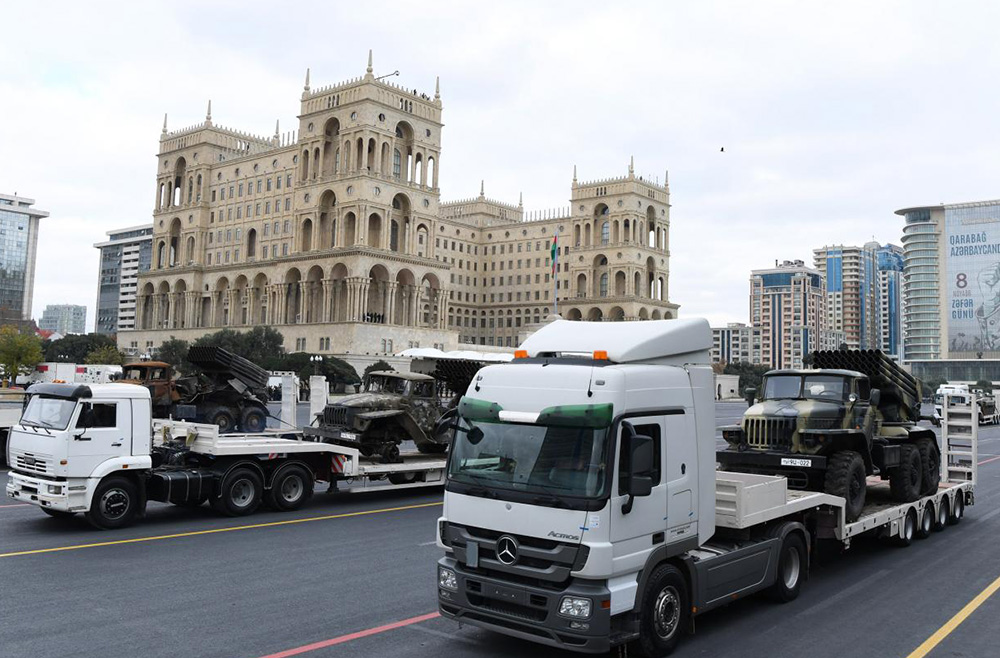
Some of the equipment seized from the Armenian army was displayed in a military parade in Baku on 10 December 2020, and is also exhibited in the Spoils of War Park, which opened in Baku in April 2021.
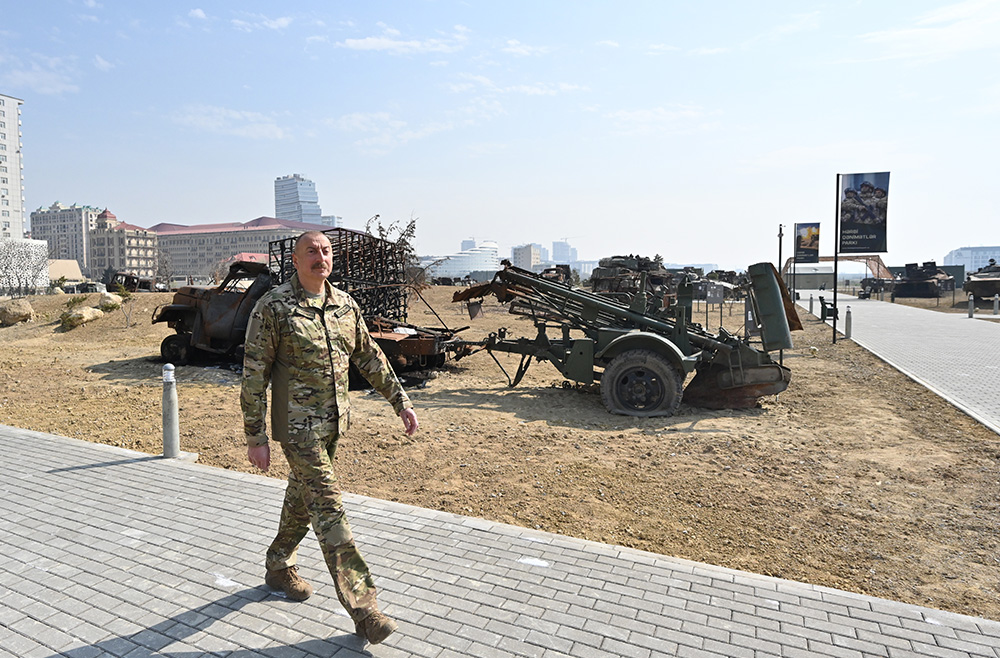
The Patriotic War has also earned the title of a “War of the 21st Century” in the world’s military science. In the face of the complex fortifications built by the enemy in difficult terrain for decades, the victorious Azerbaijani Army demonstrated true professionalism, skill, invincibility and, most importantly, proved to the world that it is ready for any sacrifice for the sake of eternal love for the Motherland.
The Great Return
The Patriotic War put an end to the longing of the Azerbaijani people for Karabakh and paved the way for the restoration and reconstruction work in the liberated territories in accordance with the latest standards. Life has returned to Karabakh. As a result of the Patriotic War, the restoration of Azerbaijan’s borderline with Armenia began, and the Zangazur corridor will soon become a historical reality.
The Shusha Declaration on Allied Relations between the Republic of Azerbaijan and the Republic of Turkey signed in Shusha on 15 June 2021 also states that the opening of the Zangazur corridor will signal the start of a new phase in the life of the region.
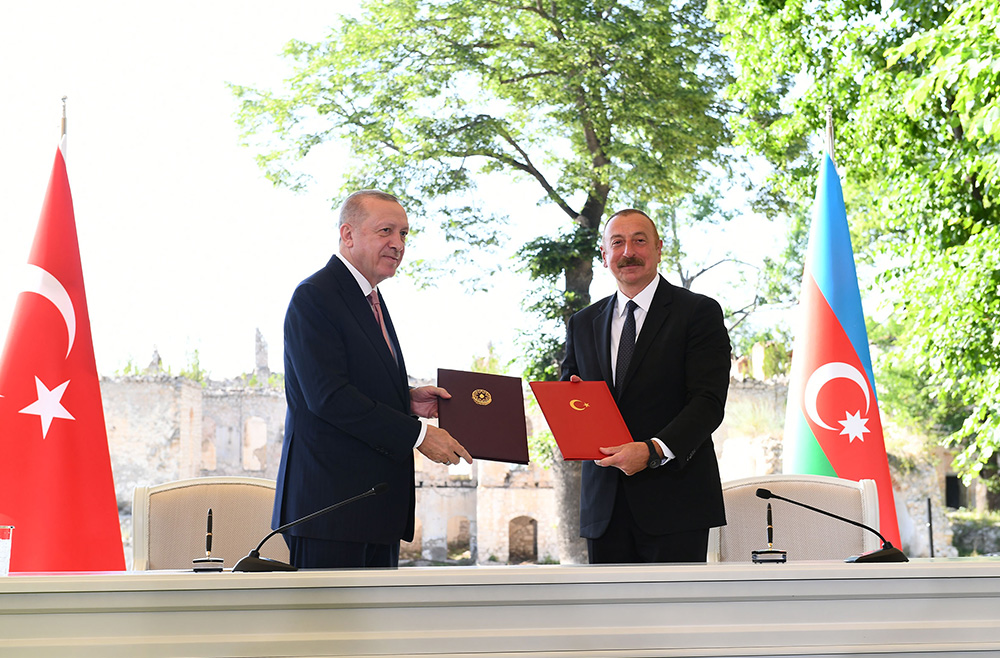
President Ilham Aliyev clearly defined the historic significance of the Shusha Declaration: “The Declaration reflects the words of the great leaders of our peoples, Mustafa Kemal Ataturk and Heydar Aliyev. In the early 20th century, Mustafa Kemal Ataturk said, ‘Azerbaijan’s joy is ours, and so is its sorrow.’ In the late 20th century, Heydar Aliyev said, ‘Turkey and Azerbaijan are one nation in two states.’ Those historic words are the primary factor in our endeavors. In the 21st century, we remain true to this testament, demonstrate our loyalty to our ancestors and guide future generations by signing the Declaration on Allied Relations in the liberated Shusha. The Joint Declaration refers to the historic Kars Agreement. The historic Kars Agreement was signed exactly 100 years ago. There is also a great symbolism in that. The Joint Declaration on Allied Relations signed in the liberated city of Shusha after 100 years shows the direction of our future cooperation.”
Another historic document signed on 7 July 2021, the “Decree of the President of the Republic of Azerbaijan on a new division of economic regions in the Republic of Azerbaijan” , became one of the primary outcomes of the Patriotic War.
Located in the eastern part of the Zangazur plateau, surrounded by the Zangazur mountain range and covering a vast area from Lachin and Kalbadjar to Nakhchivan, situated on the border with Armenia, a region that was long part of the Zangazur district established in the same geographical area in 1861, has become a part of a single economic zone – the East Zangazur Economic Region, together with Zangilan, Gubadli, Jabrayil, Lachin and Kalbadjar districts, with which it has historically had economic, historical and cultural ties. The ancient Karabakh region with its unique historical and cultural heritage and inimitable nature has become – the Karabakh Economic Region that includes Aghdam, Shusha, Fuzuli, Tartar, Khojavand, Khojaly districts and Khankendi city, as well as Aghjabadi and Barda districts.
Thus, another historical injustice that befell the Azerbaijani people during the USSR had been eliminated by President Ilham Aliyev: “… In 1923, an artificial entity was created in our territory – the Nagorno-Karabakh Autonomous Region. There were absolutely no grounds for its establishment. Although the 7 July was a tragic date for our people, in 2021 we have turned this black page. 7 July will go down in history as a remarkable date because on 7 July 2021, I signed a decree on the establishment of the Karabakh and East Zangazur economic zones, and historical justice has been restored.”
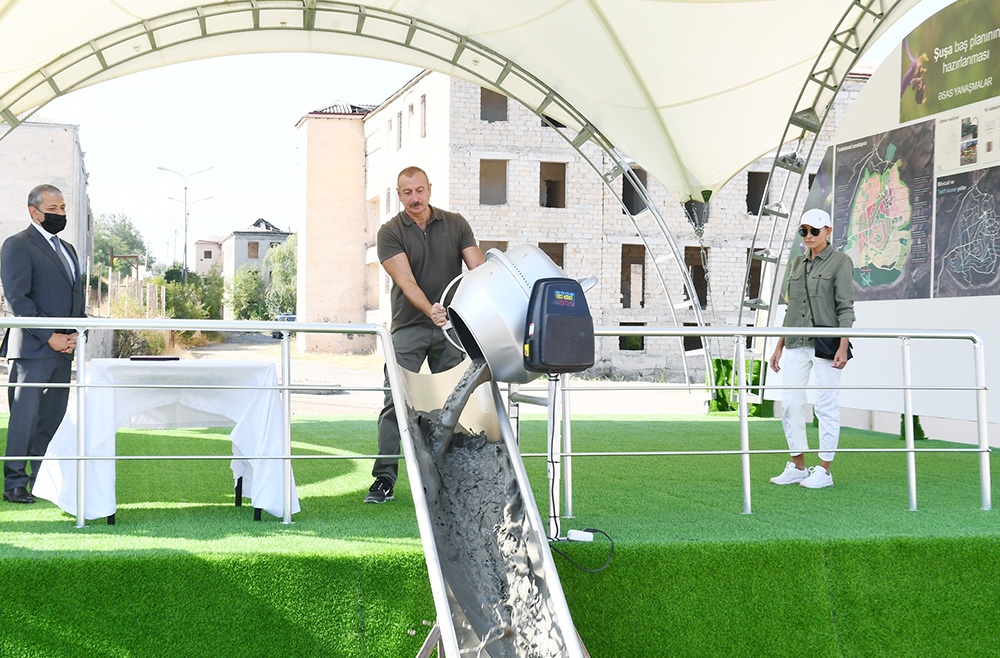
Karabakh and East Zangazur will soon become a paradise. At present, all the liberated territories are experiencing a period of great construction and restoration and are preparing for the Great Return.
